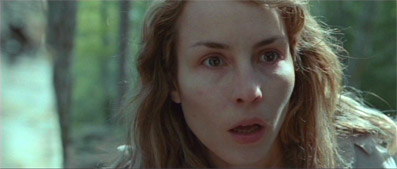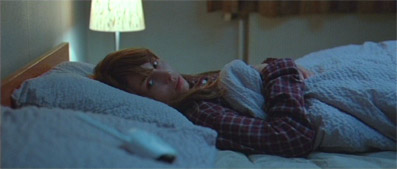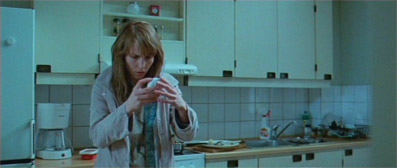|
That title isn't doing anyone any favours. Like something that was settled on when the producers couldn't come up with anything better. A psychological character study saddled with a moniker that makes it sound like a Spike Lee-directed urban comedy. Based on the title alone, one suspects writer/director Pål Sletaune's chilly thriller would have a hard time getting anyone through the doors were it not for the casting of Sweden's hottest cinematic export, Noomi Rapace. After etching herself into pop culture lore as the original Lisbeth Salander, Rapace will once again be making cinema history this June, screaming in space for Ridley Scott's return to a the genre-defining Alien franchise.
For fanboys eagerly awaiting the return of xenomorphic horror on the big screen and silently praying that Ridley doesn't go all Phantom Menace on us, I can't recommend Babycall enough, if only to see ninety minutes of Rapace proving she's more than capable of filling Sigourney Weaver's terror-quaked boots with the same de-glammed, magnetic resolve and commanding sincerity that made Ellen Ripley such an icon of the genre.

Without knowing anything of the plot, and the aforementioned title that fails to intrigue or excite (the literal English translation "baby monitor" is worse still), it's the casting of Rapace which immediately elevates Babycall to one-to-watch status. The film is noteworthy given that it's the going-supernova actress' last film made the other side of the Atlantic before Hollywood came a-calling. Released here between seasonal tent poles (last Christmas' Sherlock Holmes: A Game of Shadows and this Summer's Prometheus), it serves as a welcome cleanser after the debacle that was her blockbuster debut. The adage goes that you're only as good as your last work, and Holmes was without question one of the least auspicious English language debuts by a foreign actor in recent memory. She may have made the promotional posters but the du jour bromance at the film's centre spared no room for a feminine touch, leaving Rapace to little else to do but grin and bear her gypsy caricature under a succession of increasingly unflattering costumes.
Babycall does much to assure us then, that Holmes was but a bump on the road to superstardom, that the Tinseltown hype is more than justified and that we have every reason to be excited about this undeniable talent soon to be headlining films by Ridley Scott, Brian De Palma, and Catherine Hardwicke. Dragon Tattoo will surely remain the part for which she's best remembered, but it's Babycall that sets the bar by which all those future performances should be judged.
Rapace plays Anna, a haunted and haggard mother on the run from an abusive ex-husband. Relocated by social services to a spooky housing complex right out of Polanski's "evil apartment" trilogy, she's continually looking over her shoulder, checking her door locks at night and unable to sleep until the early hours, her son Anders tucked up in bed beside her.

An unsettling in medias res opening grabs attention with the beaten and bloodied image of Anna in jogger gear, an almost identikit getup to when Lisbeth went vigilante casual in The Girl Who Played with Fire. Whether or not this is something costume designer Ellen Ystehede purposely sought to recall, the association flips the script on Rapace's tough screen image, framed here in an unfamiliar submissive position. Robbed of the natural strength the actress has exhibited in previous roles, Anna is rendered physically weak, ordinary, and non-threatening, a far cry from the mythic avenging superhero quality of Lisbeth or the fortune teller who was more than a match for Victorian fiction's most brilliant mind. Rapace's plain-faced transformation in Babycall is so startling that it confirmed my long-held suspicion of her Samsonesque dependence on make-up to derive at least some of her formidable strength. In Girl with the Dragon Tattoo it was applied like war paint and in Holmes it had the look of pantomime drag, positioning Rapace in the most masculine role of a camp lot. On the red carpet, it serves to both assimilate her with the Hollywood set (somewhere between Stepford robot and the prerequisite orange glow of WAG) and challenge it (her icy androgyny stole the show at the recent Mercedes-Benz Fashion Week in Stockholm). Sans make-up, there's a dulling effect on both the shine of her prominent cheekbones and the defiance of her jaw, making her less otherworldly and much more relatable. Just as Nicole Kidman so successfully discarded her A-list celebrity persona in Dogville and found a flinching, natural radiance underneath the Chanel, Rapace's on-display vulnerability is Anna's most arresting quality, attracting us to her character and gaining our implicit trust even as the film begins to mount possible evidence to the contrary.
When social services – depicted as malevolent and lustful, much like the authority figures of Dragon Tattoo – pay Anna a second visit, insisting that she stop fearfully hoarding Anders to herself and give the boy his own room. So distrustful is she of the distance of even a hallway between them, that she immediately goes out and buys a baby monitor to keep an ear on him. A worrying instance of just how hung up Anna is on preserving her son's innocence comes early on when Anders, excitedly mistaking the baby monitor for a walkie-talkie, is promptly corrected by his mother. Nor does the child balk at his blatant infantilisation when Anna refers to him as her "big boy". If the film's unwieldy title carries a deeper resonance, it's that the persistent baby-talking is the means by which Anna can continue to convince herself that everything's all right. It's to Rapace's credit that Anna's toxic mollycoddling doesn't immediately villianise her and that she still elicits our sympathy. Her over protectiveness is unreasonable, but understandable given that Anders is all she has left.

When the baby monitor starts picking up the sounds of child abuse from a neighbouring apartment and Anna spirals deeper into paranoid fear, we begin to wonder: Is this for real? Is it perhaps something of phantasmagorical possibility, the sounds of a past that's not through with her just yet? Or with depressing inevitably, is it simply the sonic disintegration of a mind on the verge of full collapse? I'll venture to go one further: is her response to these sounds so terror-stricken because of a not altogether conscious fear of children, a pressure release for overcompensating paternal instinct that isn't there? Open-endedly abrading any authorial point of view of Anna's psychology, the film welcomes valid arguments for each. For the genre-savvy, Babycall offers a pretzeled contortion of second-guessed expectations; it plays your best instincts against you and keeps you guessing right up until the end. Seamlessly flipping between the world as it is, and the world according to a sleep-depraved sociopath – without the use of tired visual signifiers – writer/director Sletaune never once tips his hand until he's absolutely ready. Even when the curtain finally goes up on a forcibly abrupt series of brilliantly executed reveals in the third act, it's impossible to shake the clinging grip of ambiguity.
For all its increasing commotion, every beat of Rapace's performance is so exquisitely intuitive that the film can afford to hang back in a lower register and it's all the better for it. Taking a cue from their star's interior restrain, the filmmakers feel no need for playing at gimmicky visual uneasiness. Shot naturalistically, you keep waiting for the tawdriness of nineties home invasion thrillers to rear its head, as unwanted male visitors descend on the apartment, but the jolts are only ever psychological, a directorial refusal to take the easy out of boxed-in close-ups, canted angles and jump-inducing soundtrack clangs. The meld of reality and dreams is blurred by such restraint that it only takes the inspired redressing of an oft-visited locale to shock with all the wallop of a well-timed musical sting.
Similarly, our initial wary regard towards Anna's overprotective instinct blurs into a kind of necessary acceptance, gradually revealing itself as a contradictory form of empowerment, helping Anna to transcend the role of the pliant victim we first encounter. That Rapace is able to evoke all this without ever relying on the script to make the point for her is an astounding show of subtly. Where The Girl with the Dragon Tattoo series was a televisual showcase of her abilities, Babycall is her cinematic breakthrough, with the skill behind the camera finally equal to the talent in front of it. The title might struggle to pack them in on a Friday night, but the name above it no doubt soon will.
|